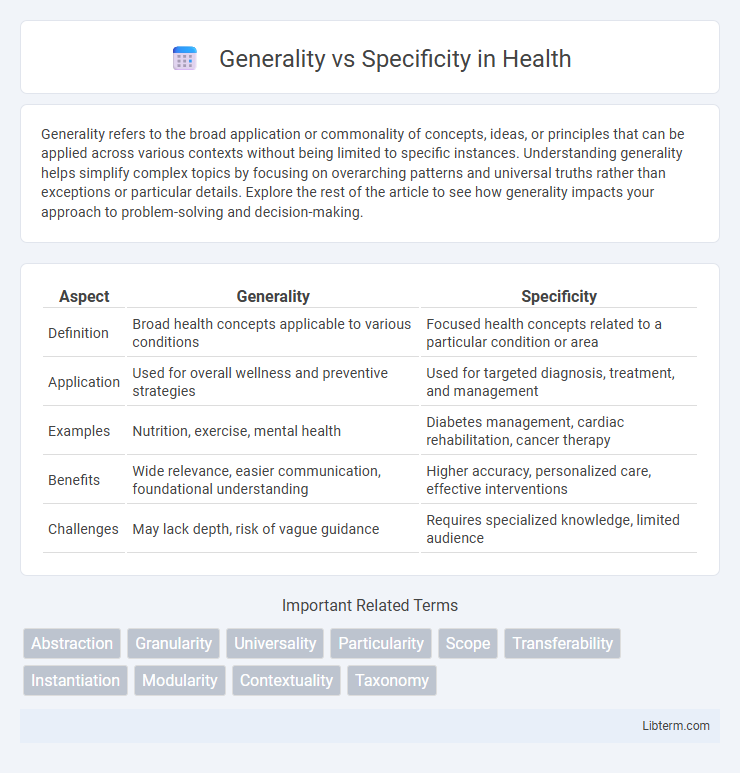Generality refers to the broad application or commonality of concepts, ideas, or principles that can be applied across various contexts without being limited to specific instances. Understanding generality helps simplify complex topics by focusing on overarching patterns and universal truths rather than exceptions or particular details. Explore the rest of the article to see how generality impacts your approach to problem-solving and decision-making.
Table of Comparison
| Aspect | Generality | Specificity |
|---|---|---|
| Definition | Broad health concepts applicable to various conditions | Focused health concepts related to a particular condition or area |
| Application | Used for overall wellness and preventive strategies | Used for targeted diagnosis, treatment, and management |
| Examples | Nutrition, exercise, mental health | Diabetes management, cardiac rehabilitation, cancer therapy |
| Benefits | Wide relevance, easier communication, foundational understanding | Higher accuracy, personalized care, effective interventions |
| Challenges | May lack depth, risk of vague guidance | Requires specialized knowledge, limited audience |
Understanding Generality and Specificity
Understanding generality involves recognizing broad concepts that apply across multiple contexts, providing a flexible framework for problem-solving and knowledge integration. Specificity focuses on detailed, precise information tailored to a particular context or instance, enhancing accuracy and relevance in application. Balancing generality and specificity enables effective communication and decision-making by aligning abstract principles with concrete examples.
The Importance of Context in Generality vs Specificity
Understanding the balance between generality and specificity is crucial for accurate communication, as context determines the appropriate level of detail needed. In technical fields like machine learning, generality allows models to apply broadly across datasets, while specificity enhances performance on targeted tasks. Context guides the choice, ensuring clarity and relevance in both information dissemination and decision-making processes.
Advantages of General Approaches
General approaches offer broad applicability across diverse problems and domains, enabling scalable solutions that save time and resources during development. They facilitate adaptability and flexibility, allowing systems to handle unforeseen scenarios without requiring extensive redesign or retraining. Enhanced knowledge transfer and reuse from general models supports efficient learning and innovation in multiple fields, driving continuous improvement and robust performance.
Benefits of Specific Solutions
Specific solutions enhance problem-solving efficiency by targeting precise needs and minimizing resource waste. They improve user satisfaction through tailored features that address unique challenges, leading to higher adoption rates. Furthermore, specific solutions facilitate easier maintenance and upgrades by narrowing the scope to well-defined requirements.
Challenges in Balancing Generality and Specificity
Balancing generality and specificity presents challenges such as maintaining flexibility while ensuring relevance in diverse contexts. Overgeneralization may lead to vague or unhelpful outcomes, whereas excessive specificity can limit applicability and scalability. Achieving the optimal balance requires careful consideration of target audience needs, domain constraints, and desired precision levels.
Applications in Everyday Decision-Making
Generality allows individuals to apply broad principles across various contexts, enabling flexible problem-solving in everyday decision-making. Specificity enhances accuracy by focusing on detailed information tailored to particular situations, improving targeted outcomes. Balancing general cognitive frameworks with specific contextual cues optimizes practical choices in daily life scenarios.
Impact on Communication and Clarity
Generality in communication allows messages to reach a broader audience but often sacrifices clarity, leading to potential misunderstandings. Specificity enhances precision and understanding by providing detailed information, which reduces ambiguity and improves the effectiveness of the message. Balancing generality and specificity is crucial for optimizing communication clarity and ensuring the intended impact on diverse audiences.
Generality vs Specificity in Problem-Solving
Generality in problem-solving allows the application of broad strategies across diverse situations, enhancing adaptability and efficiency in identifying solutions. Specificity focuses on tailored approaches that address unique problem characteristics, often yielding more precise and effective outcomes in specialized contexts. Balancing generality and specificity is crucial for optimizing problem-solving effectiveness by leveraging universal principles while adapting to particular challenges.
Striking the Right Balance: Best Practices
Striking the right balance between generality and specificity enhances clarity and relevance in communication by tailoring content to the target audience's needs while maintaining broad applicability. Employing precise language with context-driven examples ensures messages resonate without losing essential nuance, optimizing both engagement and comprehension. Best practices include defining clear objectives, prioritizing key details, and incorporating flexible frameworks adaptable across varied scenarios.
Future Trends in Generalized and Specific Approaches
Future trends in generalized approaches emphasize adaptive AI systems capable of handling broad, diverse tasks through advanced transfer learning and meta-learning techniques. Specific approaches are evolving with domain-specialized models that leverage deep expertise in fields like healthcare, finance, and autonomous systems, ensuring precision and reliability. Hybrid frameworks combining the flexibility of generalized AI with the accuracy of specialized models are gaining traction, driving innovations in personalized user experiences and industry-specific applications.
Generality Infographic

 libterm.com
libterm.com